Filipínské zkušenosti: ilegálně vytěžené dřevo bylo proměněno na 146,000 školních lavic
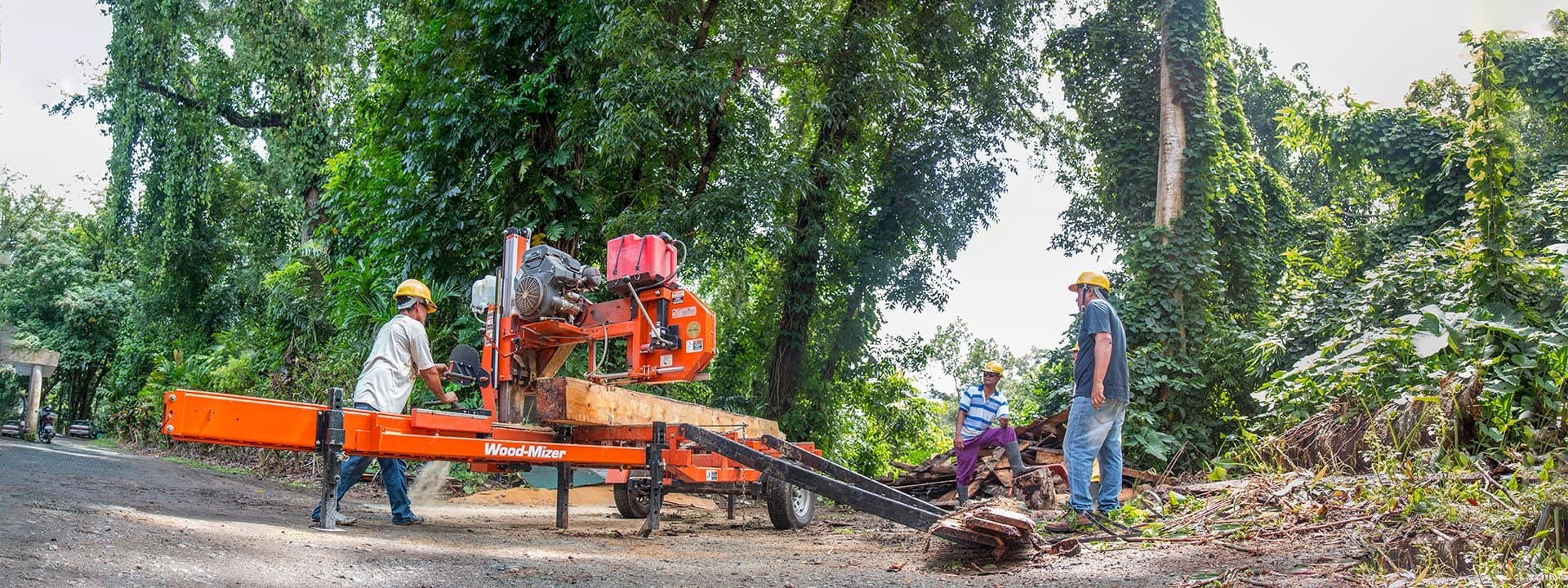
Na světě je řada zemí, které se pokoušejí úplně zastavit proces nezákonné těžby dřeva. Filipíny nalezly jedinečný, nápaditý a ekonomický způsob k řešení tohoto problému s pomocí pil Wood-Mizer.
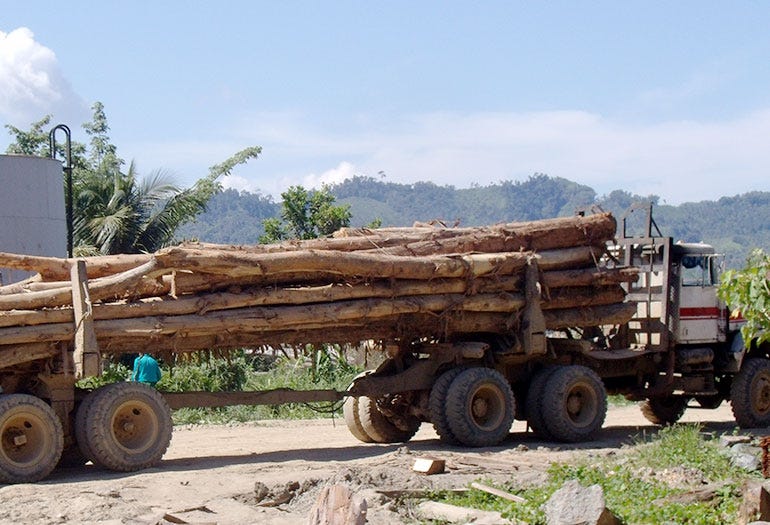

When logs are illegally felled and transported to other countries, this denies local Philippines the benefit of their own good timber.
Over the last few years, the Philippines has made great efforts to curb illegal logging. Aerial and water borne surveillance assist in determining where agents will make raids on suspicious activities, while road checkpoints target timber in transit. These activities have resulted in the confiscation of illegally-logged timber and the prosecution of those responsible.
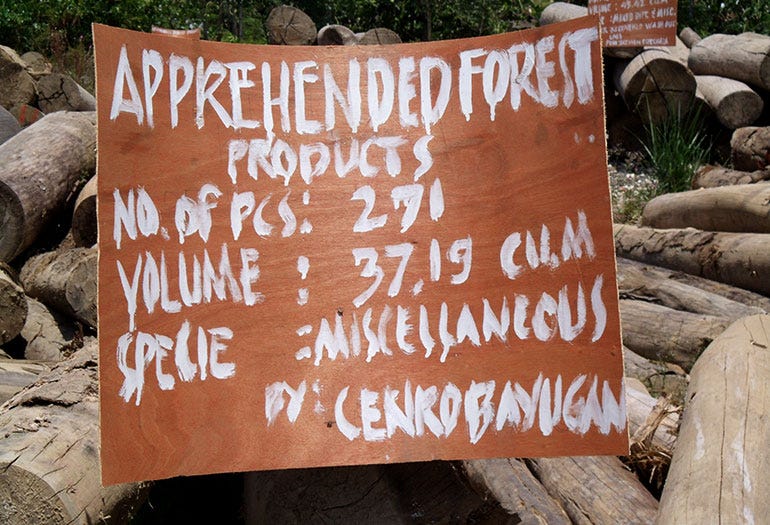

A pile of apprehended logs lies exposed to the element. Without a salvage plan, they would rot.
Through these raids and checkpoint stops, approximately 66000 cubic meters (28.5 million bd. ft.) of high quality timber was confiscated from 2010 to 2014 alone.
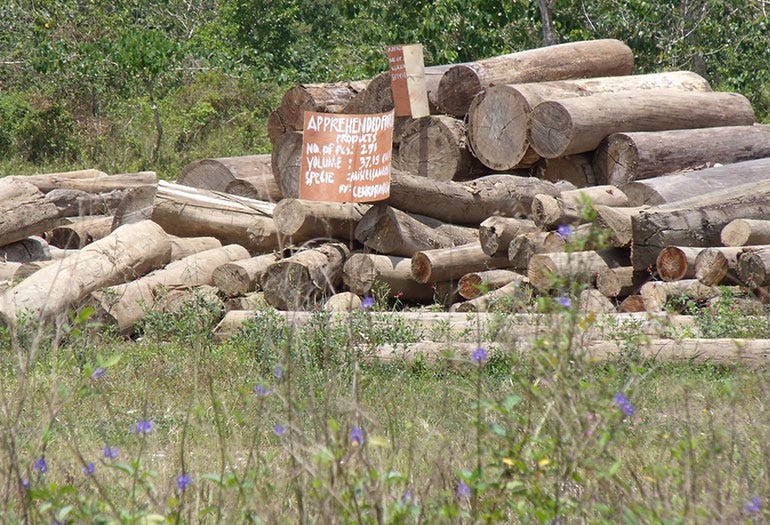

Ve 20. století ztratily Filipíny rozsáhlou těžbou většinu ze svého hustého zalesnění. Nedávno vláda realizovala nový přístup, který zvrátil trend dalšího odlesňování, ale zbývajícím lesům stále hrozí neoprávněná těžba, která se uskutečňuje.
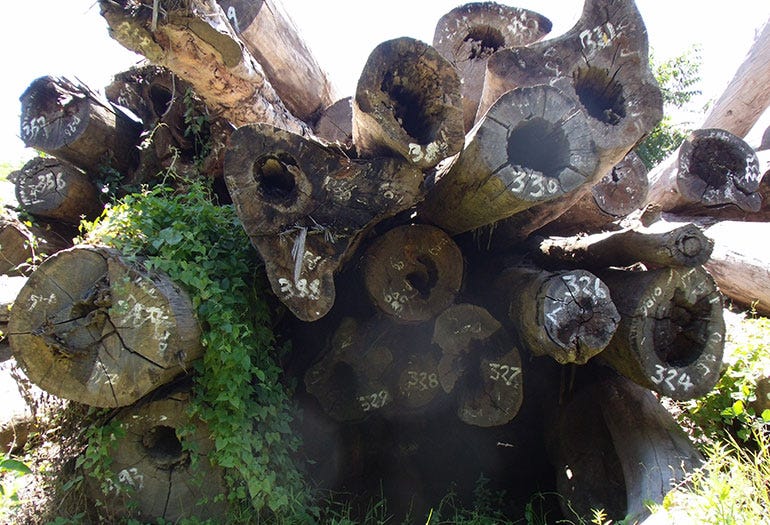

Když jsou kmeny poraženy a odvezeny do jiných zemí, ztrácejí místní obyvatelé ze svého vlastního dřeva prospěch.
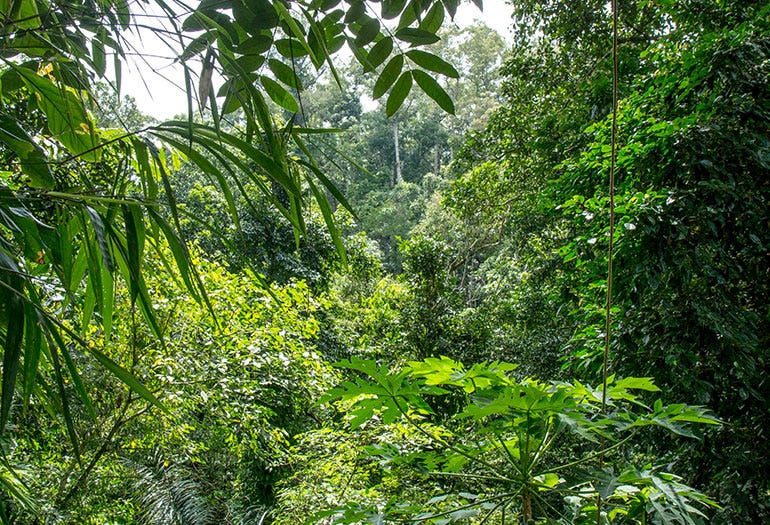

Během posledních několika let vyvinuly Filipíny ohromné úsilí k omezení ilegální těžby. Dohled ze vzduchu a na vodě pomáhá s určením kde mají agenti provést razie na podezřelých činnostech, zatímco siniční kontroly sledují cíl dřeva při průjezdu. Tyto aktivity končí konfiskací ilegálně vytěženého dřeva a postihem odpovědných osob.
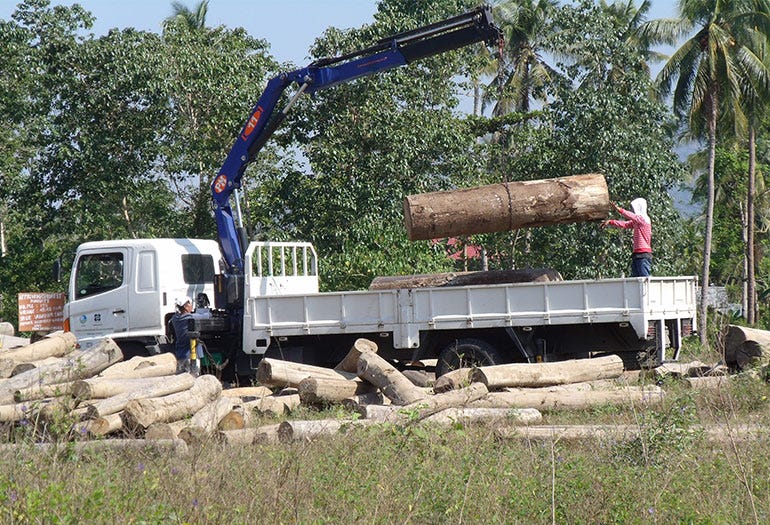

At that time public schools across the Philippines lacked at least 2.5 million chairs. (http://www.philstar.com/good-news/774042/chairs-public-schools-illegal-logs) In 2010, the Technical Education Skills and Development Authority (TESDA), Department of Education (DepEd), Philippine Amusement and Gaming Corporation (PAGCOR) and DENR proposed the P-Noy Bayanihan Project that government-confiscated logs could be used to build new furnishings for local schools.
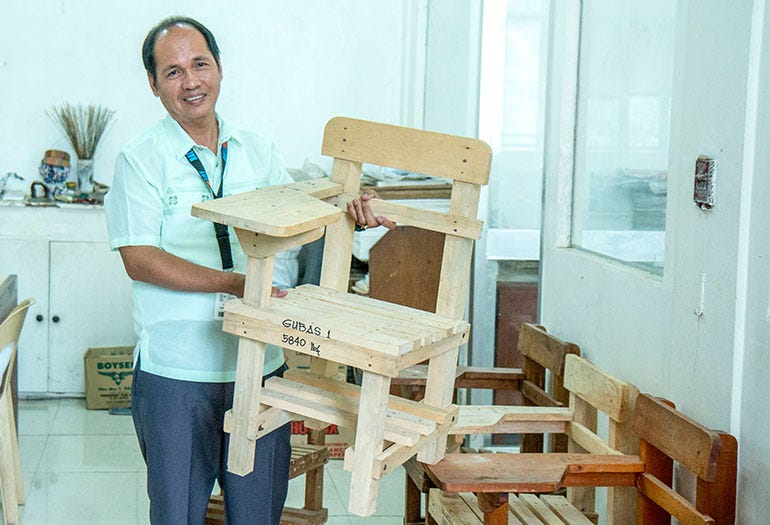

Dr. Dwight Eusebio demonstrates a finished chair.
The mission of DENR, TESDA, DepEd and PAGCOR was simple. They wanted to take the logs that had been confiscated, salvage them, mill them, and create school tables and chairs for local schools. They began by cutting the wood and sending it away to be refurbished, but eventually they were able to begin manufacturing the furniture themselves. It was a complete turnaround for the Filipino community. The Forest Products and Development Institute-Department of Science and Technology (FPRDI-DOST) was also tapped by DENR to convert confiscated logs into lumber and transported them to TESDA, Agusan del Sur.
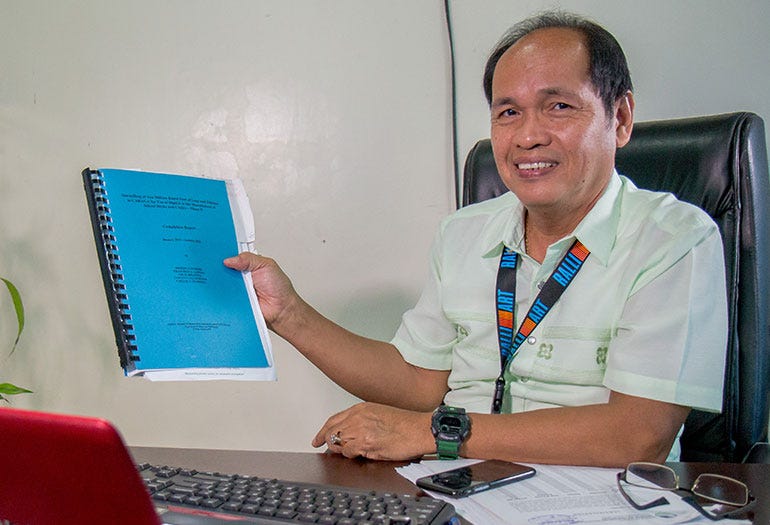

The report entitled: ‘Sawmilling of Ten Million Board Feet of Logs and Flitches in CARAGA for Use of DepEd in the Manufacture of School Desks and Chairs’
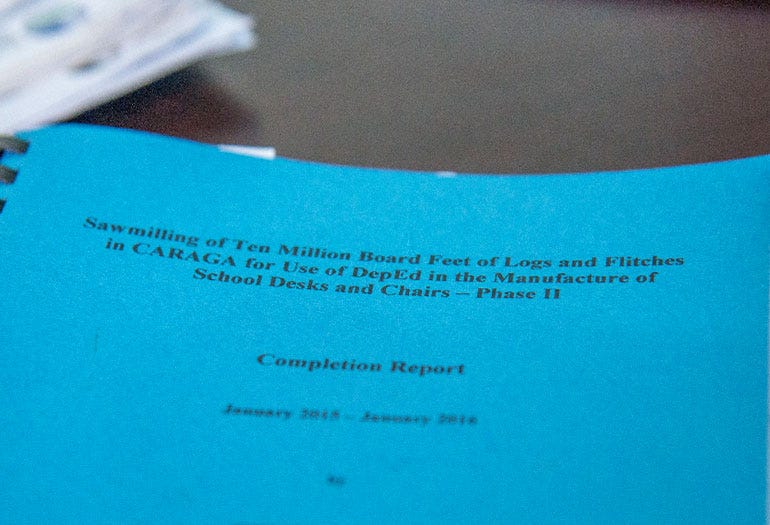

A collaborative project between DENR and FPRDI-DOST entitled: ‘Sawmilling of Ten Million Board Feet of Logs and Flitches in CARAGA for Use of DepEd in the Manufacture of School Desks and Chairs’
A collaborative project between DENR and FPRDI-DOST entitled: ‘Sawmilling of Ten Million Board Feet of Logs and Flitches in CARAGA for Use of DepEd in the Manufacture of School Desks and Chairs’ was implented. Ten million board feet is more than 23,000 cubic meters of wood! And this is just from the Caraga region of the Philippines – a fraction of the whole country.
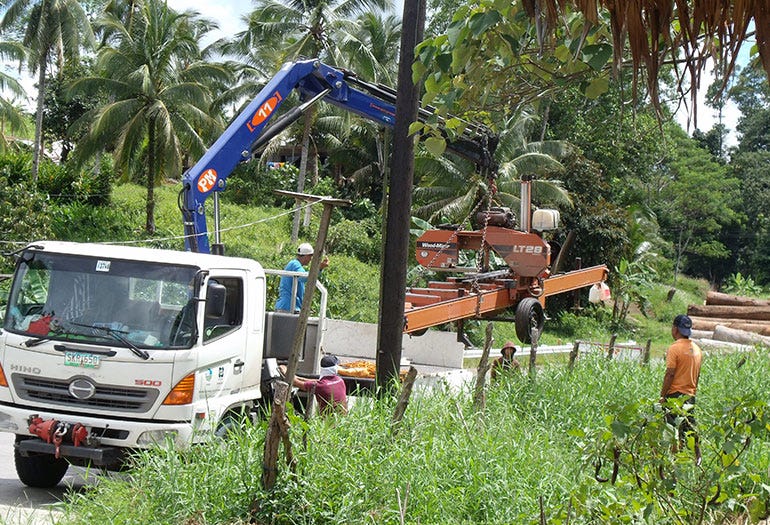

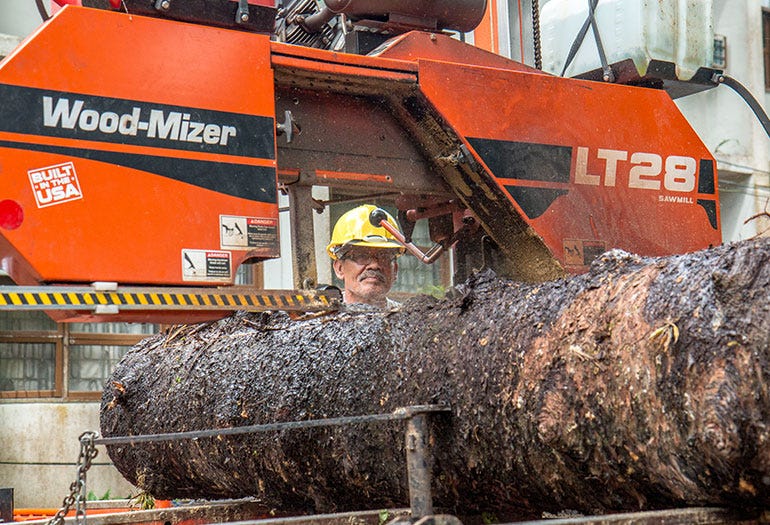

Wood-Mizer uses thin-kerf blade technology to reduce waste to the absolute minimum during the processing of logs into a finished product.
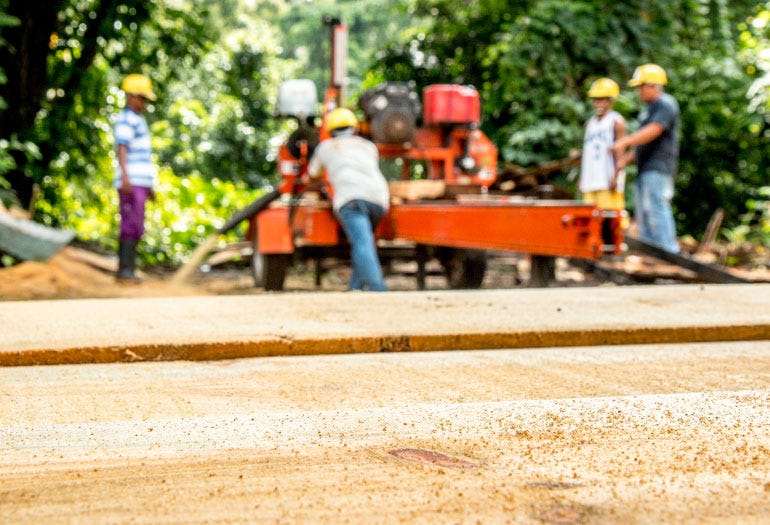

Prostřednictvím těchto razií a kontrolních bodů bylo jen od roku 2010 do roku 2014 zabaveno přibližně 66,000 kubických metrů vysoce kvalitního dřeva.
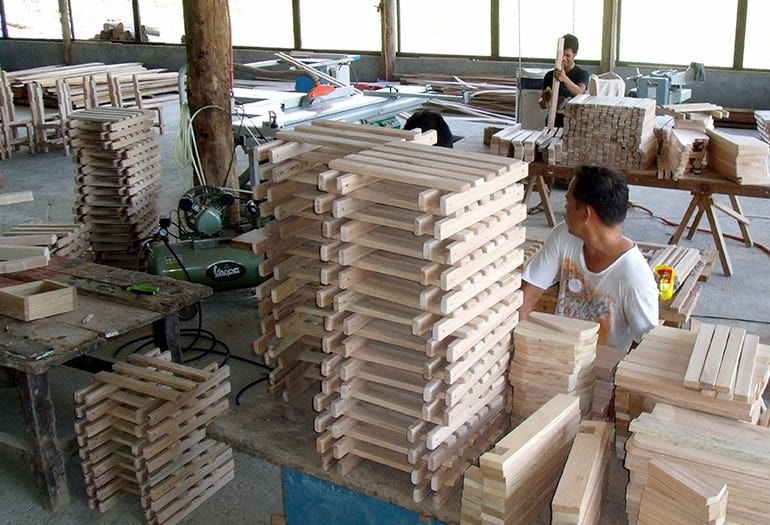

Workers convert illegally-logged timber into components for school desks and chairs.
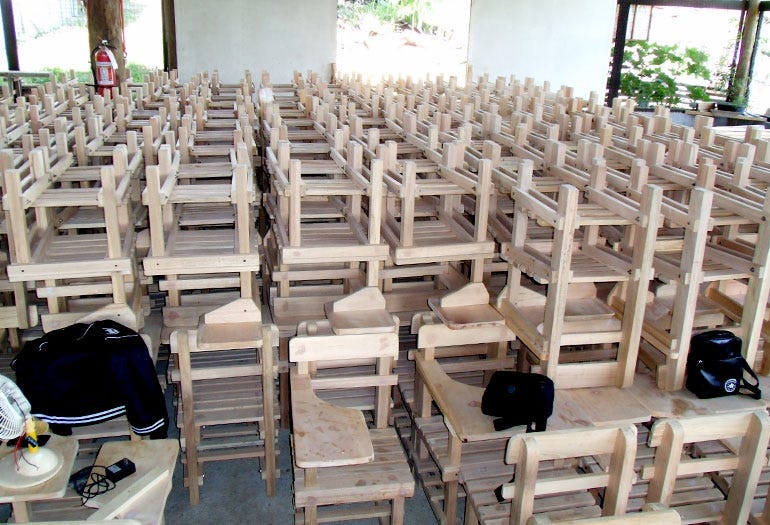

Konfiskované dřevo bylo uskladňováno po celých Filipínách, obvykle nepříliš daleko od místa, kde bylo zadrženo. Kmeny byly ponechány venku, na dešti a prudkém slunci, což způsobovalo jejich trouchnivění. Takový zdroj neměl být promarněn a vláda zahájila proces, aby posloužil lidem.
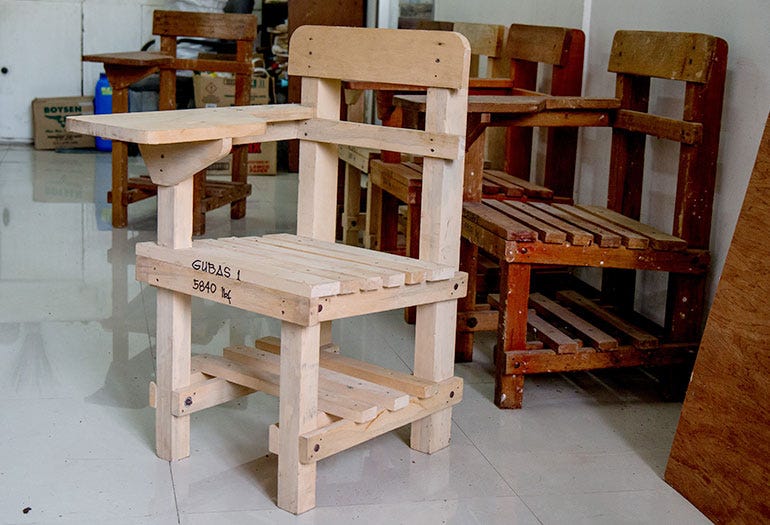

A finished school desk built to last for many generations of students.


Státní činitelé čelili problému – co dělat s tak ohromnými hromadami vysoce kvalitního dřeva rozesetými po celém ostrově, aby se předešlo jeho eventuálnímu zničení? Přišli s myšlenkou najít způsob jak tyto kmeny využít pro filipínskou společnost.
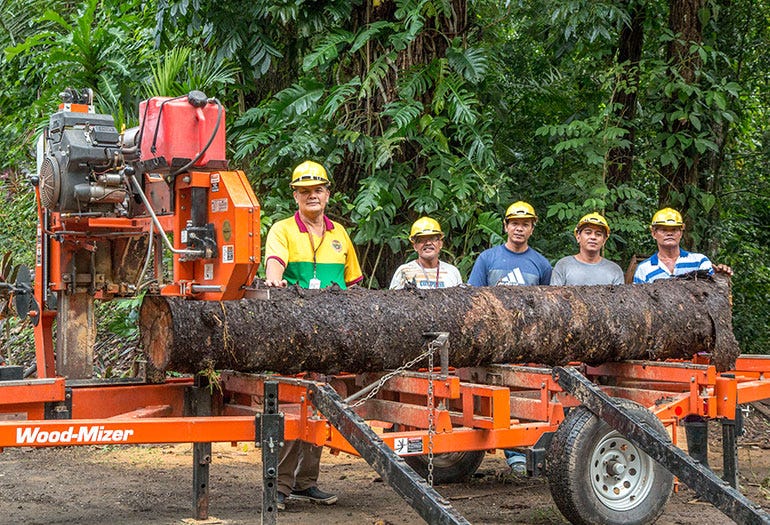

The use of 10 Wood-Mizer mobile sawmills allowed for salvage projects to take place anywhere in the Philippines.
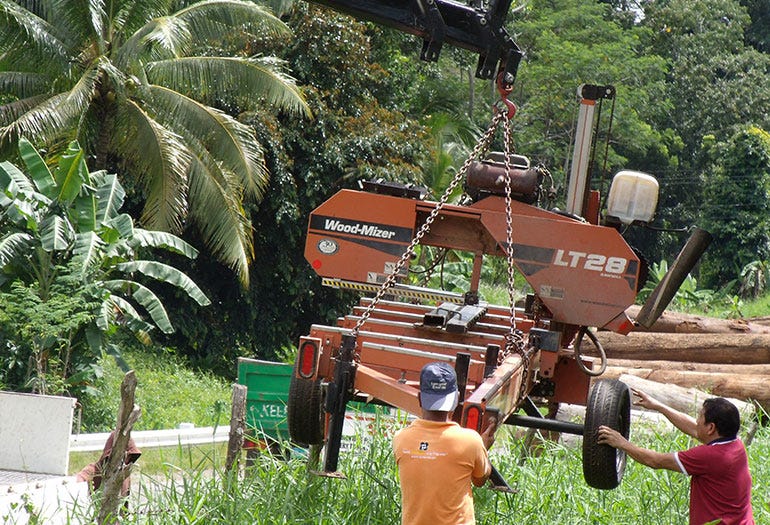

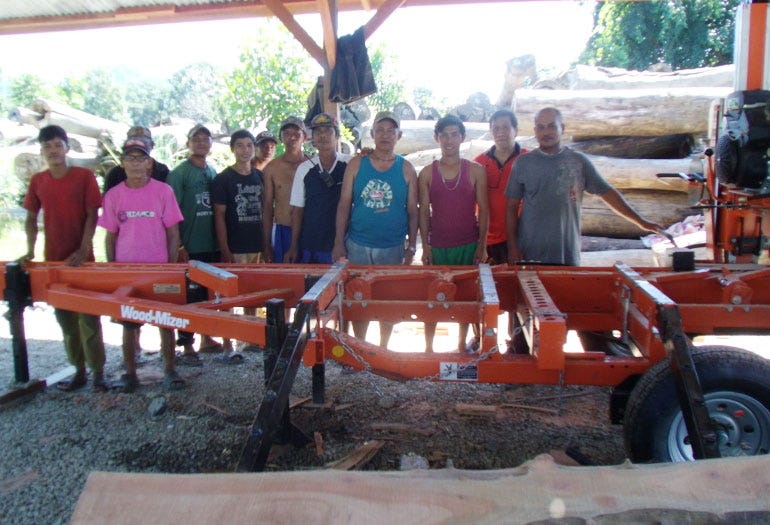

V té době ve veřejných školách napříč Filipínami chybělo aspoň 2.5 milionu židlí. V roce 2010 byl na Filipínách zahájen projekt, ve kterém vládou zkonfiskované kmeny mohly být použity na nové zařízení pro místní školy.
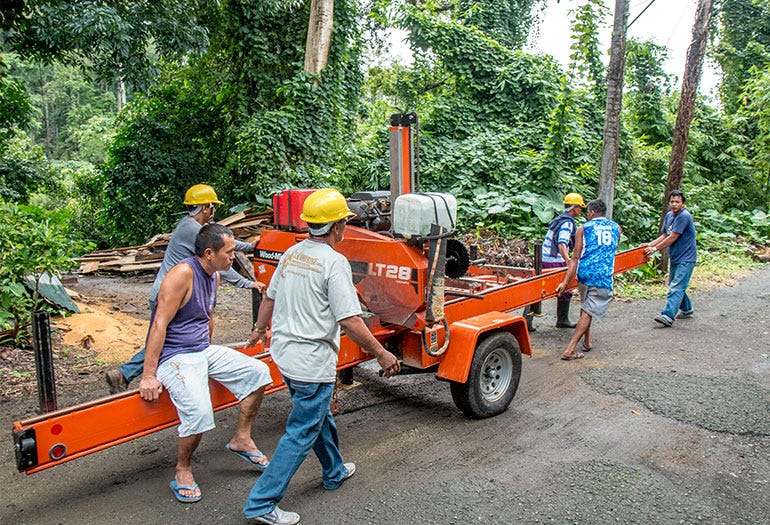

Dr. Eusebio also recognized the efficiency of sawmills because they take up so little energy. In Kenya, the energy efficiency and minimal wastage of the Wood-Mizer machines impressed forestry officials so much that they banned new sawmillers from using any other kind of sawmill in their businesses. As reported in The Star, Kenya in April, 2016, the Kenyan Forestry Service issued new rules in order to more effectively combat illegal logging operations, by requiring licensed sawmillers to use thin-kerf sawmills only.
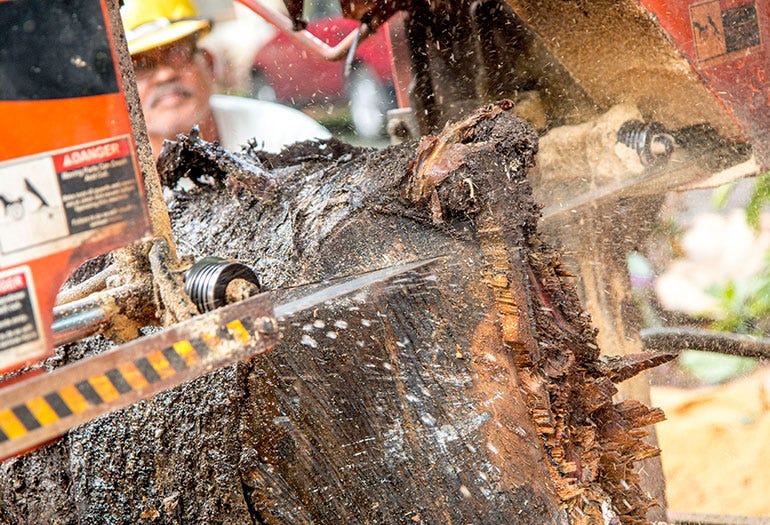

Od roku 2011 bylo vyrobeno více než 146,000 kusů školního nábytku a bylo opraveno 369 školních budov s použitím těchto dřevěných výrobků.
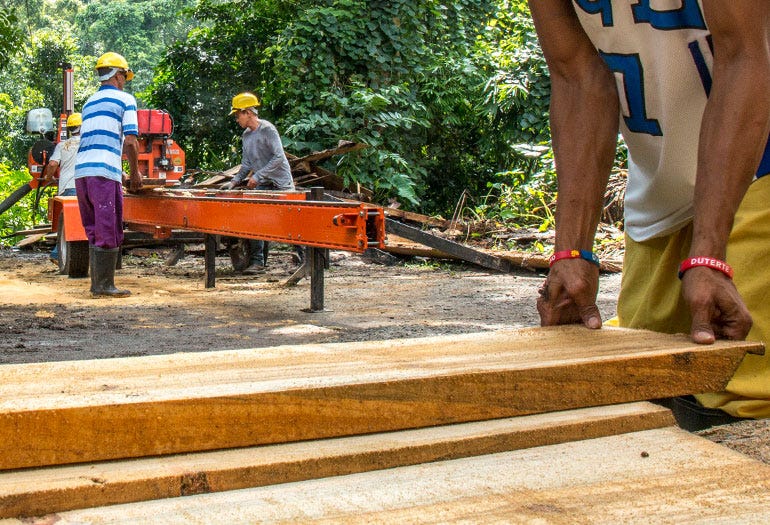

The logs that are able to be salvaged from illegal logging confiscation are used to grow the woodworking factory and train people. The DENR now has ten Wood-Mizer sawmills and they have been deployed all over the vast country. They transport these sawmills to places where illegally-felled logs have been stored after confiscation.
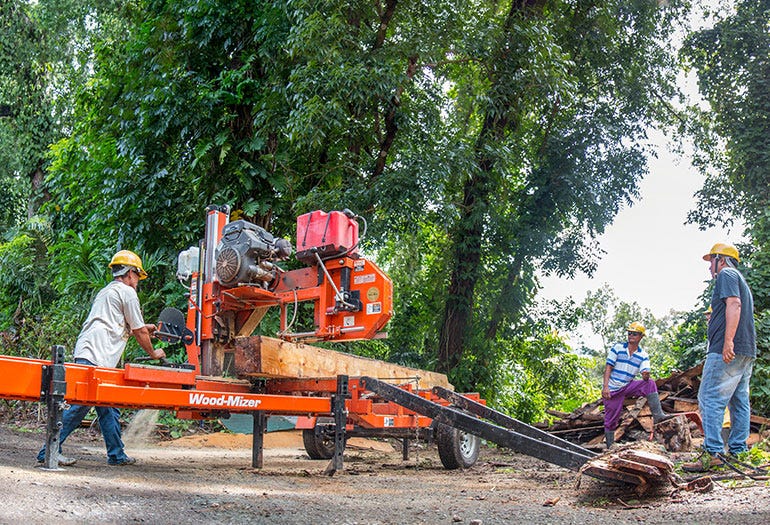

Better sawmill technology = a better outlook for forestry sustainability.
Eusebio concludes. “I hope that the forest will once again become green, just like 50 years ago. If you look at the statistics, it’s very sad to learn that we have very few forested areas left. But now the number is going back up because of the National Greening Program.”
After six years of nonstop processing of illegally felled trees and production of something better for the economy and the environment, the National Greening Program and DENR were able to work and not only build thousands of chairs and tables, but also find a way to grow and manage the forests around them.
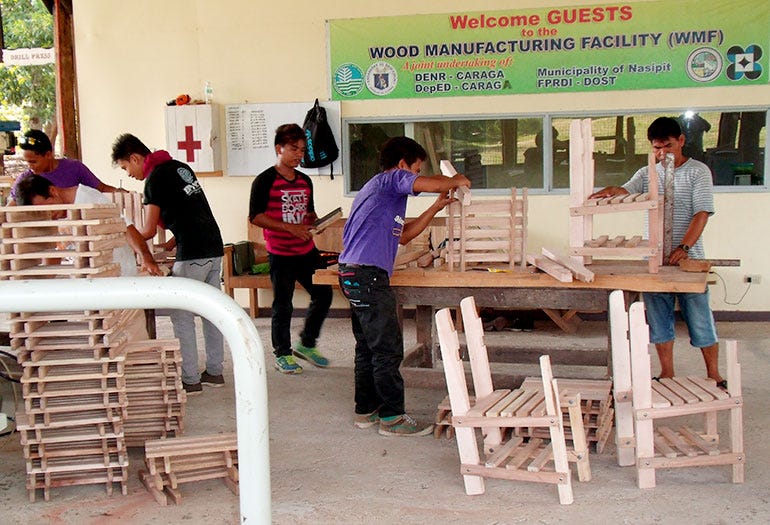

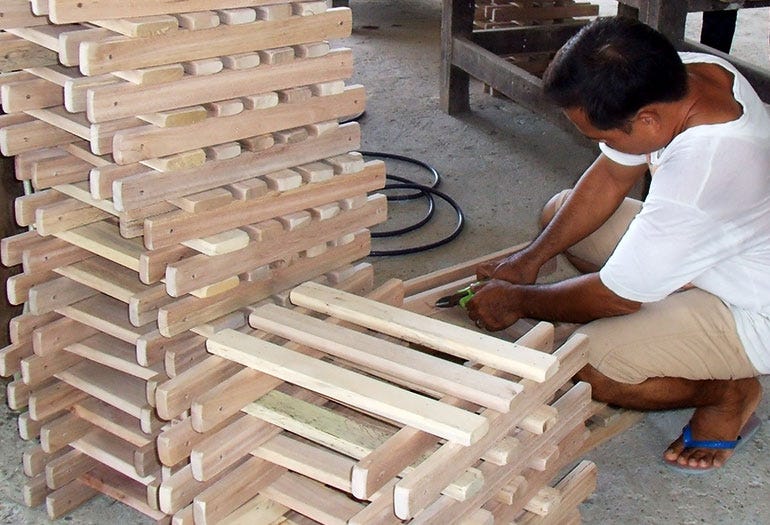

Než tento projekt začal, měl pracovní tým jednu pilu. Nicméně, poté co byl projekt plně schválen, rozhodl se tým zakoupit pět dalších mobilních pil Wood-Mizer. Nyní provozují deset pil Wood-Mizer a ty jsou rozmístěny po celé rozlehlé zemi. Pily se dopravují na místa, kde byly ilegálně vytěžené kmeny po konfiskaci uskladněny.
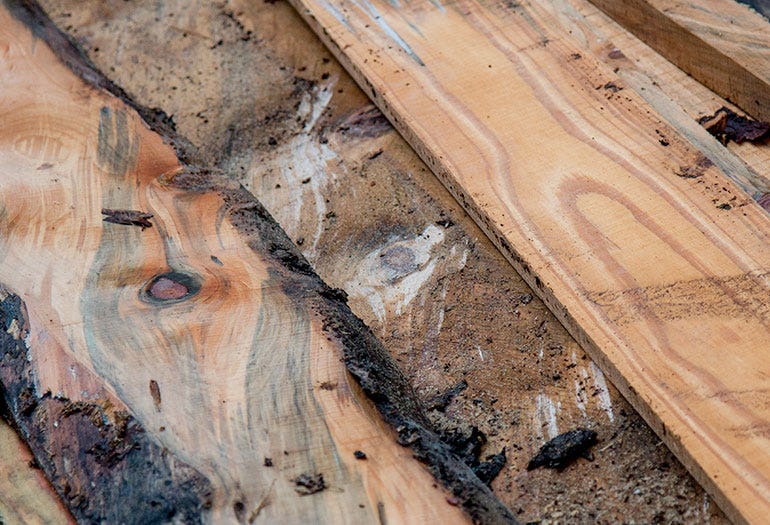

10 Wood-Mizer sawmills allowed the project to be successful in salvaging the millions of board feet of wood into high quality timber for the school desks.
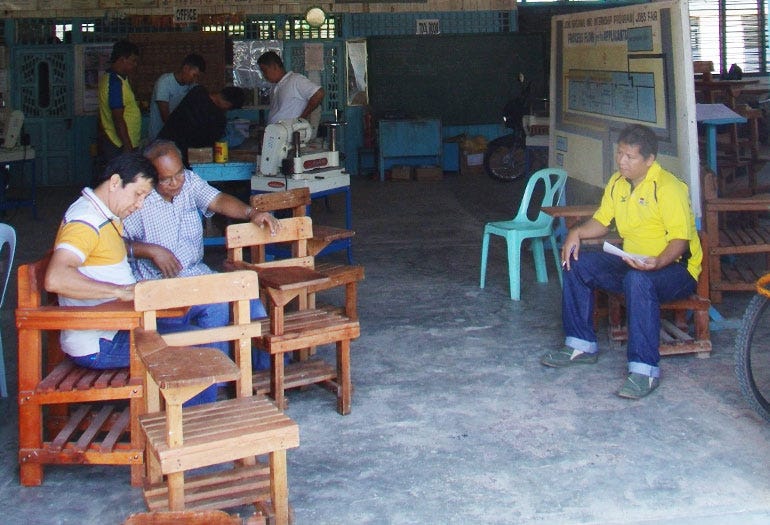

Workers convert illegally-logged timber into components for school desks and chairs.
Important to remember though is that many illegal loggers are not large corporations – they’re simple farmers or villagers who do not have many opportunities to generate income.
“A lot of illegal loggers are simple people who are mainly trying to feed their own children. Especially for our upland dwellers, wood is their source of income that allows their children to go to school.” shares Teodulfo Delgado, Engineer with the College of Forests & Natural Resources in Los Banos, Philippines. Hand-in-hand with enforcement of anti-illegal logging regulation needs to come provisions for better economic development.
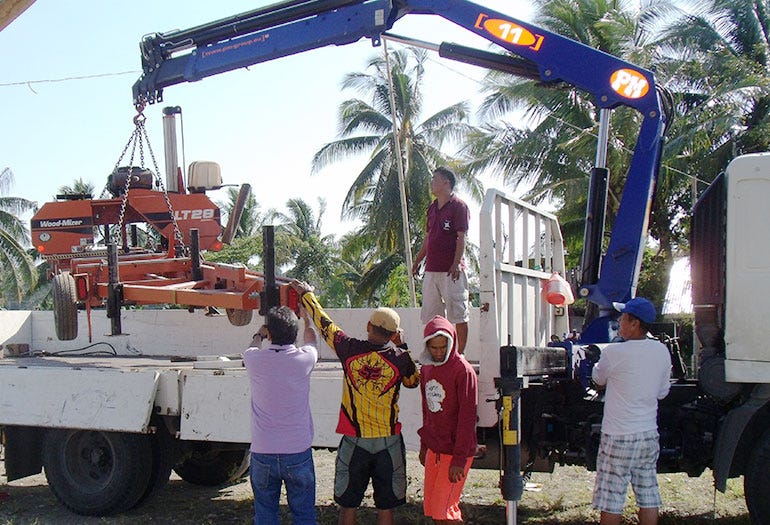

Additional Sources & references:
• http://newsinfo.inquirer.net/180877/seized-logs-to-find-use-as-chairs-tables-for-schools
• http://www.philstar.com/good-news/774042/chairs-public-schools-illegal-logs
• http://www.philstar.com/cebu-news/2015/05/15/1454993/denr-7-illegal-tree-cutting-still-rampant
• http://www.denr.gov.ph/news-and-features/latest-news/2056-denr-optimistic-to-achieve-zero-illegal-logging-hotspot-target-by-2016.html
• http://news.abs-cbn.com/nation/09/10/14/denr-taps-nbi-fight-vs-illegal-logging

